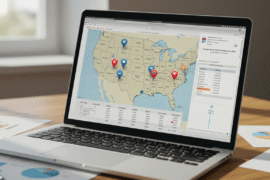This article may contain references to products or services from one or more of our advertisers or partners. We may receive compensation when you click on links to those products or services. Nonetheless, our opinions are our own.
The information presented in this article is accurate to the best of our knowledge at the time of publication. However, information is subject to change, and no guarantees are made about the continued accuracy or completeness of this content after its publication date.
As a parent, you always want to find ways to support your family and teach your kids important life skills at the same time. But have you ever thought about how your kids could help you with your money plans? Many parents feel the stress of rising costs and taxes, but what if there was a way to make things easier? You can teach your kids the value of hard work and responsibility by giving them age-appropriate tasks and paying them for their work. This will also help your family get important tax breaks. This is how you can pay your kids and save on taxes at the same time. It will help you manage your family’s money and teach the next generation the value of hard work.
- The Basics of Paying Your Kids Legally and Tax-Efficiently
- Exploring Eligible Job Opportunities for Your Kids to Boost Their Earnings
- Maximize Tax Benefits from Family Employment
- Choosing the Right Payment Methods and Keeping Accurate Records
- Making the Most of Tax Deductions and Credits Related to Family Employment
- Building Financial Literacy Through Work Experience for Your Kids
- Final Thoughts
- Frequently Asked Questions
- Recommended Reads
The Basics of Paying Your Kids Legally and Tax-Efficiently
There are a few important things to think about when it comes to paying your kids for helping out with your family business or other activities. First, you need to know that giving your kids money can lower the amount of taxes you owe. When you hire kids, you can move some of your income into a lower tax bracket because kids usually fall into a lower tax category. This means they might not have to pay any taxes on the money they make, which lets you use your family’s tax-efficient strategies to their fullest.
To make sure you’re doing it right, do these:
- Reasonable compensation: Pay them a fair wage for the work they are actually doing.
- Document everything: Keep records of hours worked and tasks performed. This not only supports your tax claims but also teaches your kids about accountability.
- Age and task appropriateness: Ensure the work is suitable for their age and skills. Simple tasks like yard work or assisting with office errands can be a great start.
Here’s a simple breakdown of potential payouts based on task categories:
| Task | Average Hourly Rate | Age Suitability |
|---|---|---|
| Lawn Care | $10 to 15 | 12+ |
| Office Help | $12 to 18 | 14+ |
| Pet Sitting | $8 to 12 | 10+ |
Implement these strategies to create a structure where your kids learn financial responsibility while you enjoy potential tax benefits. Just be sure to comply with local labor laws specific to minors, setting the stage for a financially savvy future for your children.
Exploring Eligible Job Opportunities for Your Kids to Boost Their Earnings
When you think about how to help your kids make their own money, it’s important to look into job options that are both age-appropriate and good at helping them make more money. Tell them to think about what they like and what they’re good at.
Here are some eligible job opportunities they might consider:
- Babysitting: If your child enjoys working with younger kids, this can be a lucrative option.
- Pet sitting or dog walking: For animal lovers, this is a great way to earn some cash while having fun.
- Lawn care or gardening: Many neighbors appreciate assistance with yard work, especially during the summer.
- Online tutoring: If your child excels in a particular subject, tutoring younger students can be both rewarding and profitable.
- Freelance gig work: Platforms like Fiverr or Upwork allow teens to offer skills like graphic design or writing.
Regardless of the job they choose, remind them to keep track of their earnings. This can teach them valuable lessons about income and taxes. Also, employing your kids can unlock potential tax benefits for you as a parent. Since children have a lower tax rate, compensating them for work can reduce your overall family tax liability while teaching them important money management skills.
Maximize Tax Benefits from Family Employment
If you want to use family employment as a tax strategy, you need to know the IRS rules so you can get the most out of it. First, make sure your child is old enough and doing real work. You can pay kids as young as 7 years old to work in your family business, which is a great way to start saving money on taxes. Getting a paycheck not only teaches your kids the value of work, but it might also mean that their earnings are below the standard deduction limit, so you can pay them without paying taxes. It’s also very important to keep careful records of everything. Keep accurate records of the hours worked, the job descriptions, and the payments made.
Consider the following points:
- Use a reasonable wage: Pay your child a wage comparable to what you would pay someone else for the same job.
- File tax forms: Maintain compliance by filing the appropriate IRS forms, like the W-2 for your children.
- Retirement benefits: Consider setting up a Roth IRA for your child to teach them about investments while allowing their earnings to grow tax-free.
| Benefits | Details |
|---|---|
| Tax Savings | Potentially reduce your taxable income while providing valid employment. |
| Financial Literacy | Teach kids about income, savings, and budgeting. |
| Retirement Benefits | Funds can grow tax-free in a Roth IRA. |
You can come up with a good plan that helps both your family’s finances and your kids’ early financial education by following IRS rules and knowing the ins and outs of hiring your kids.
Voted "Best Overall Budgeting App" by Forbes and WSJ
Monarch Money helps you budget, track spending, set goals, and plan your financial future—all in one app.
Get 50% OFF your first year with code MONARCHVIP
Choosing the Right Payment Methods and Keeping Accurate Records
When it comes to compensating your kids, choosing the right payment methods is important for both convenience and record-keeping.
Here are some popular options you might consider:
- Direct deposit: This method can help you automate payments, making it effortless to transfer funds directly to your child’s bank account.
- Cash payments: Cash can be a simple option if you want to be more hands-on, but make sure to keep good records for tax purposes.
- Checks: Writing a check provides a paper trail, ensuring you have documentation for tax records.
- Digital wallets: Apps like PayPal or Venmo can simplify transactions while allowing for easy tracking of payments.
No matter the method you choose, maintaining accurate records is necessary. Ensure that you keep logs that detail each payment, including the date, amount, and purpose of the payment.
Use a simple table like the one below to organize this information:
| Date | Amount | Payment Method | Purpose |
|---|---|---|---|
| 03/01/2023 | $50 | Direct Deposit | Chores |
| 03/15/2023 | $30 | Cash | Babysitting |
Organizing these papers will help you during tax season and also teach your child how to be responsible with money. You and your kids will both benefit from this structured way of doing things.
When you hire your kids to work in the family business, you’re not only giving them a chance to learn and make money, but you’re also opening up a range of tax deductions and credits that can make your life a lot easier. If you hire your kids, you can write off their pay as a legitimate business expense, which lowers the amount of money you have to pay taxes on. Also, if your child works for you in a sole proprietorship or partnership and is under 18, they won’t have to pay Social Security or Medicare taxes on their earnings. This is a great benefit for your family’s budget.
To maximize your savings, consider the following strategies:
- Set reasonable salaries: Pay them a fair wage that reflects the work they do, ensuring it aligns with industry standards.
- Document everything: Keep precise records of their hours worked and the tasks performed, as clear documentation is vital if you face an audit.
- Explore tax credits: Investigate credits like the Child Tax Credit or the Earned Income Tax Credit that could apply depending on your family’s financial situation.
| Deduction Type | Details |
|---|---|
| Wages Paid | Claim the wages you pay your kids as a business expense. |
| Education Expenses | Certain educational expenses may be deductible. |
| Health Insurance | Premiums paid for their coverage can be deducted if they’re employed. |
By strategically employing your children and taking advantage of these deductions and credits, you’re not only reducing your tax burden but also instilling valuable work ethics and life lessons in them.
Building Financial Literacy Through Work Experience for Your Kids
Combining real-world work with your kids’ learning can be a very effective way to teach them about money. Give them small jobs to do around the house or at work to get them started. This could be anything from taking care of the garden to helping with paperwork to even starting a lemonade stand. They’ll not only make some money, but they’ll also learn how to work hard and manage their money. When they get older, you can talk to them about things like interest and investing, and you can stress the importance of saving and budgeting. If you want this method to be good for your family’s finances, think about setting up a structured payment system.
Use a table like this to track their earnings:
| Task | Payment | Frequency |
|---|---|---|
| Lawn Mowing | $15 | Weekly |
| Car Washing | $10 | Bi-weekly |
| House Cleaning | $20 | Monthly |
Also, you can use this experience to find a way to make money that is good for your taxes. Make sure to keep good records of the payments you make to them for their work. These payments may be tax-deductible for your business. Be sure to keep accurate records and talk to a tax expert to make sure you’re following the rules. This way, your kids will learn about money and how to save it, and they might even help the family save money on taxes. The lessons they learn now will help them as adults by teaching them how to handle money responsibly for the rest of their lives.
Final Thoughts
Paying your kids to do age-appropriate work is a good way to teach them responsibility and a good way to save money for your whole family. You can lower your taxable income and help your kids learn about money by following IRS rules, keeping good records, and picking the right ways to pay. These early experiences can help kids develop good habits about how to earn, save, and budget their money, whether it’s doing small chores around the house or working for the family business. If you think about it and do it legally, hiring your kids is more than just a way to save on taxes; it’s also a way to invest in their future.
Frequently Asked Questions
What are the benefits of paying my kids for work they do?
There are a number of tax benefits to paying your kids to work. First, it lets you move money from your higher tax bracket to your child’s lower tax bracket, which could lower the amount of tax your family has to pay overall. You can also put the money your child makes into a Roth IRA or use it for their education. This teaches them how to be responsible with money and encourages them to save.
How can I ensure the work my kids do is legitimate?
It’s very important to keep track of the work they do and pay them a fair wage for it to make sure the work is real. This could be anything that adds value, like doing chores, helping with your business, or any other work. If there is an audit, it is important to keep records and detailed descriptions of their work.
What is the maximum amount I can pay my kids without triggering the need to file a tax return?
For the tax year, children can earn up to a certain threshold without needing to file a tax return. As of 2023, this amount is typically around $13,850. Check the current IRS guidelines, as this can change, but staying under this limit helps you avoid additional filing requirements for your child.
Are there any tax forms I need to file when I pay my kids?
You usually won’t need to fill out any more tax forms if you pay your child less than the filing threshold and the work they do for your business is considered work. You should keep detailed records. You might have to file a W-2 or other tax forms if you pay them more than the threshold or if they do a lot of work.

Reviewed and edited by Albert Fang.
See a typo or want to suggest an edit/revision to the content? Use the contact us form to provide feedback.
At FangWallet, we value editorial integrity and open collaboration in curating quality content for readers to enjoy. Much appreciated for the assist.
Did you like our article and find it insightful? We encourage sharing the article link with family and friends to benefit as well - better yet, sharing on social media. Thank you for the support! 🍉
Article Title: Tax Hack for Parents: Legally Pay Your Kids and Keep More Cash
https://fangwallet.com/2025/08/12/tax-hack-for-parents-legally-pay-your-kids-and-keep-more-cash/The FangWallet Promise
FangWallet is an editorially independent resource - founded on breaking down challenging financial concepts for anyone to understand since 2014. While we adhere to editorial integrity, note that this post may contain references to products from our partners.
The FangWallet promise is always to have your best interest in mind and be transparent and honest about the financial picture.
Become an Insider

Subscribe to get a free daily budget planner printable to help get your money on track!
Make passive money the right way. No spam.
Editorial Disclaimer: The editorial content on this page is not provided by any of the companies mentioned. The opinions expressed here are the author's alone.
The content of this website is for informational purposes only and does not represent investment advice, or an offer or solicitation to buy or sell any security, investment, or product. Investors are encouraged to do their own due diligence, and, if necessary, consult professional advising before making any investment decisions. Investing involves a high degree of risk, and financial losses may occur including the potential loss of principal.
Source Citation References:
+ Inspo
Nübel, B. (2025). SMART MONEY KIDS: A Parent’s Guide to Digital Finance Education. Björn Nübel.












































